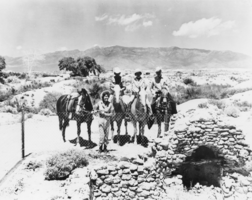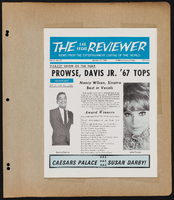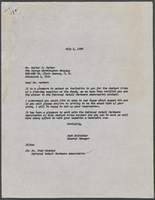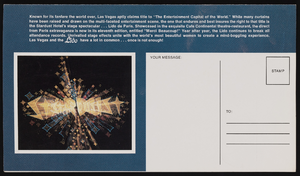Search the Special Collections and Archives Portal
Search Results
Barbara Davis oral history interviews
Identifier
Abstract
Oral history interviews with Barbara Davis conducted by Joanne Goodwin on December 18, 1996 and March 25, 1997 for the Women's Research Institute of Nevada (WRIN) Las Vegas Women Oral History Project. Davis opens her interviews by discussing her audition for the Folies Bergere as a dancer with limited experience. Davis describes working with the Folies Bergere as a touring showgirl in the 1940s. She discusses touring the United States in the Folies Bergere, touring South America for three years, and going to college at night while performing during the day. Davis then talks about the city of Reno, Nevada and working as a showgirl there. Davis addresses common rumors about showgirls, such as being involved in prostitution or being addicted to gambling. She then discusses her interest in education in her later years including earning various post graduate degrees. Davis ends her interview with a discussion on classic entertainment of the 1940s, including vaudeville and entertainment hotspots of the time.
Archival Collection

Transcript of interview with Jerome "Jerry" Jay Vallen by Lisa Gioia-Acres, October 2, 2007
Date
Archival Collection
Description
Text

University of Nevada System Board of Regents Law School Feasibility Study
Date
Archival Collection
Description
Folder contains a Law School Feasibility Study for the Board of Regents of the University of Nevada System conducted by management consultants Cresap, McCormick and Paget Inc. From the University of Nevada, Las Vegas William S. Boyd School of Law Records (UA-00048).
Text

People and horses at Hidden Hills Ranch: photographic print
Date
Archival Collection
Description
From the Nye County, Nevada Photograph Collection (PH-00221) -- Series IV. Pahrump, Nevada -- Subseries IV.D. Wiley Family. The remains of a fireplace believed to have been constructed by the Indians. Left to right: Ruth Ellerbrook; unidentified; unidentified; Frank Ellerbrook, husband of Ruth Ellerbrook. Mrs. Ellerbrook was Mrs. America. In the 1930s, Bob Lee, a long-time resident of the Pahrump Valley area and at that time more than 80 years old, told Wiley that this site and another like it on the Hidden Hills Ranch was in the fallen-down condition seen here when Lee was a small boy. Lee's statement suggests that the fireplace is more than 120 years old.
Image

Letter from C. A. Earle Rinker to his family, October 25, 1906
Date
Archival Collection
Description
Text





